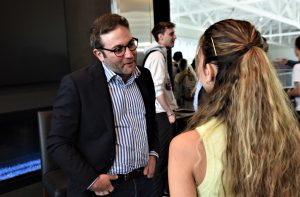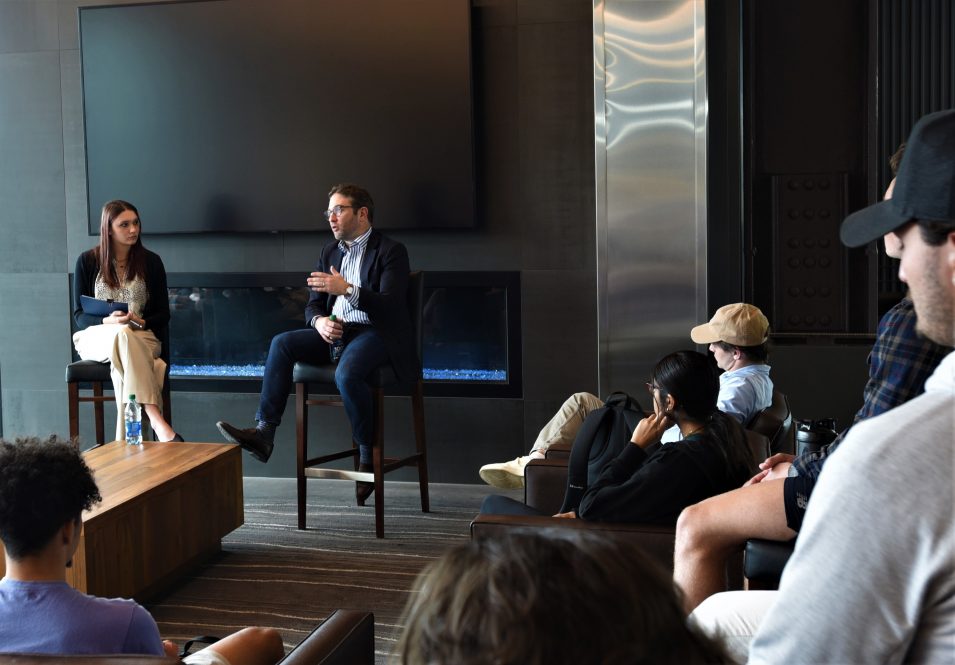Jake Sherman got some really good advice from a fellow reporter when he joined the newsroom at the Wall Street Journal.
“Don’t try to be a generalist,” he shared. “Find your niche, and be really good at one thing, and people will always need you around.”
Sherman offered that advice – and his thoughts on the current state and future of journalism in the United States – to more than 70 journalism and entrepreneurism students who attended a moderated discussion with the political journalist and author, held at the Toscano Family Ice Forum’s Blue Line Club on Tuesday afternoon.
For more than a decade, Sherman has worked in his own niche, covering national politics with a focus on reporting on the U.S. Congress, congressional leadership, and the politics of legislating. He worked for 11 years as the top congressional reporter on Capitol Hill for POLITICO and the co-author of POLITICO’s Playbook newsletter. But after watching the news organization grow from a newsroom of 20 to a worldwide operation of more than 500, he decided to leave.
And to launch his own online political news venture, forcing him to wear a familiar hat – that of the journalist – and a brand new one: that of the entrepreneur.
“It was a huge risk,” he said. “But I think, in life, you know when it’s time to take a risk.”
On January 3, 2021, Sherman and his longtime collaborators Anna Palmer and John Bresnahan launched Punchbowl News, a membership-based news community focused on the in-depth reporting on the individuals who power the U.S. legislature.
Their initial launch depended on their own credibility and reputation as trusted and respected journalists within the beltway to garner subscribers. Three days later, when rioters stormed the U.S. Capitol on January 6 and Sherman was reporting from inside the building, Punchbowl News’ membership numbers jumped.
“That was a huge boost for us,” he said, “because everyone wanted to know what was happening at the Capitol.”
Punchbowl News delivers its in-depth reporting to subscribers through three daily newsletters – a morning, an afternoon, and an evening edition. The morning edition is free, while the afternoon and evening are available only to paid subscribers.
It’s a model that people once said could never be profitable, said David Noble, director of UConn’s Peter J. Werth Institute for Entrepreneurship and Innovation, which co-sponsored Tuesday’s discussion with UConn’s Journalism Department. But entrepreneurship, he noted, offers the opportunity for innovators to break new ground, even in a traditionally slow-moving field like news.

“There was a period where people would say you cannot make money with emails,” Noble said. “It’s not going to work. People won’t pay for it. And the reality is that, if you are the best at it, people will pay you.”
The best is what Sherman and his team strive for, and it’s a message that resonated with Sophia Dover ’24 (CLAS), a junior double majoring in psychological sciences and journalism who moderated the discussion.
“It’s a sink-or-swim kind of a field, and if you’re the best at something, there’s always going to be a place for you,” she said. “I think that’s really important. You have to really be able to put yourself out there and to allow yourself the energy and the space to take those risks.”
It also resonated with Irene Soteriou ’23 (CLAS), a double major in statistics and cognitive science – “You can do really big things, and it doesn’t really matter where you come from,” she said – though she still finds political polarization in the country “a little scary.”
Sherman – who grew up in Stamford and whose parents, Bob and Stephanie Sherman, both graduated from UConn in 1979 – said he still considers himself a journalist, and that the road to journalistic entrepreneurship hasn’t always been easy. He’s not a website expert, and hiring staff and reporters, especially as a small operation, is an ongoing challenge.
He’s also not trying to solve the polarization problem in American politics.
“We’re not going to solve journalism,” he said. “We don’t think we’re going to solve political polarization, nor do we think that’s our job.”
But journalism is a business, Sherman said, and reporters don’t work for free.
“I’m in this business to break news, and make sure people read me and make money off that,” he said, and it’s an innovative model that’s working for Punchbowl News.
It’s also an example of how, although news has changed drastically over the past 25 years, and despite the myriad new ways of receiving, consuming, and interacting with news, journalism itself is still important, noted Marie Shanahan, an associate professor at UConn and head of the Department of Journalism.
“We’re exposed to more information today than ever before, and smart responsible journalists do the hard and sometimes thankless job of helping us to find the signal within the noise and make sense of it,” she said. “Good journalism matters and it needs to be financially supported to survive. Entrepreneurship is one way that happens.”



